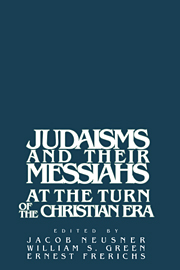Book contents
- Frontmatter
- Contents
- Preface
- List of Contributors
- 1 Introduction: Messiah in Judaism: Rethinking the Question
- 2 Wisdom Makes a Difference: Alternatives to “Messianic” Configurations
- 3 Salvation without and with a Messiah: Developing Beliefs in Writings Ascribed to Enoch
- 4 How the Authors of 1 and 2 Maccabees Treated the “Messianic” Promises
- 5 Messianism in the Maccabean Period
- 6 Waiting for the Messiah: The Spiritual Universe of the Qumran Covenanters
- 7 Philo and Messiah
- 8 Messiah and Gospel
- 9 Christology in Mark's Gospel
- 10 The Question of the Messiah in 4 Ezra
- 11 From Jewish Messianology to Christian Christology: Some Caveats and Perspectives
- 12 Mishnah and Messiah
- General Index
- Index to Biblical and Hermeneutical Texts
5 - Messianism in the Maccabean Period
Published online by Cambridge University Press: 08 January 2010
- Frontmatter
- Contents
- Preface
- List of Contributors
- 1 Introduction: Messiah in Judaism: Rethinking the Question
- 2 Wisdom Makes a Difference: Alternatives to “Messianic” Configurations
- 3 Salvation without and with a Messiah: Developing Beliefs in Writings Ascribed to Enoch
- 4 How the Authors of 1 and 2 Maccabees Treated the “Messianic” Promises
- 5 Messianism in the Maccabean Period
- 6 Waiting for the Messiah: The Spiritual Universe of the Qumran Covenanters
- 7 Philo and Messiah
- 8 Messiah and Gospel
- 9 Christology in Mark's Gospel
- 10 The Question of the Messiah in 4 Ezra
- 11 From Jewish Messianology to Christian Christology: Some Caveats and Perspectives
- 12 Mishnah and Messiah
- General Index
- Index to Biblical and Hermeneutical Texts
Summary
The Terminology
The terms “Messiah” and “messianism” are used in various ways in modern scholarship. Sometimes “messianism” is used very broadly for any eschatological tableau that involves the salvation of Israel, whether or not an individual Messiah is involved. So Schuerer's classic History of the Jewish People, in its recently revised edition, offers “a systematic outline of messianism based on all the inter-Test a mental sources, including the Dead Sea Scrolls, but presented according to the pattern emerging from the Apocalypses of Baruch and Ezra, since it is in these two late compositions that eschatological expectation is most fully developed.” However useful such a synthesis may be as a collection of motifs, it surely distorts the historical picture by retrojecting a pattern from the late first century C.E. on the preceding centuries, and blurs the boundaries of actual messianic expectation. Even when the discussion is restricted to the expectation of an individual figure, the term Messiah is still used in various ways:
1. Perhaps the simplest criterion for determining messianic references is the use of the term mšîa or its equivalents (christos, unctus, etc.). The modern scholarly usage of “Messiah,” however, does not simply correspond to the usage of the ancient texts, since it is restricted to anointed figures who have eschatological significance. Allusions to an anointed king in 2 Samuel, to God's anointed in Ps. 2, to an anointed prince in Daniel 9 or the prophets as anointed ones in the Qumran scrolls are not usually regarded as “messianic.” The eschatological use of Messiah still involves considerable variety.
- Type
- Chapter
- Information
- Judaisms and their Messiahs at the Turn of the Christian Era , pp. 97 - 110Publisher: Cambridge University PressPrint publication year: 1988
- 3
- Cited by



